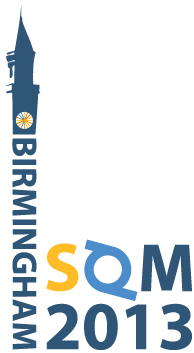Speaker
Dr
Pasi Huovinen
(Frankfurt Institute for Advanced Studies)
Description
In hydrodynamical modeling of the ultrarelativistic heavy-ion
collisions the freeze-out is typically performed at a constant
temperature. In this work we introduce a dynamical freeze-out
criterion, which compares the hydrodynamical expansion rate with the
pion scattering rate [1]. Previous studies [2] have shown that
differences between constant temperature and dynamical freeze-out
criteria are small in the transverse momentum spectra, but the effect
on flow anisotropies has not yet been studied. Recently many
calculations have been done using event-by-event hydrodynamics, in
which case the expansion rate does not necessarily behave as nicely as
in the case of smooth initial conditions. Thus it is interesting to
check how the dynamical freeze-out changes hadron distributions with
respect to the constant temperature freeze-out.
In this contribution we present hadron spectra and elliptic and
triangular flow calculated using (2+1)-dimensional ideal
hydrodynamics, and show the differences between constant temperature
and dynamical freeze-out criteria. First we discuss the systematics of
the dynamical freeze-out, and for simplicity these calculations have
been performed using smooth initial states. Finally dynamical
freeze-out condition is applied to event-by-event calculations to
evaluate v_2 and v_3. We find that in event-by-event calculations, pion v_2 is sensitive to the freeze-out criterion.
[1] C. M. Hung and E. V. Shuryak, Phys. Rev. C 57, 1891 (1998).
[2] K. J. Eskola, H. Niemi and P. V. Ruuskanen, Phys. Rev. C 77, 044907 (2008).
Author
Dr
Pasi Huovinen
(Frankfurt Institute for Advanced Studies)
